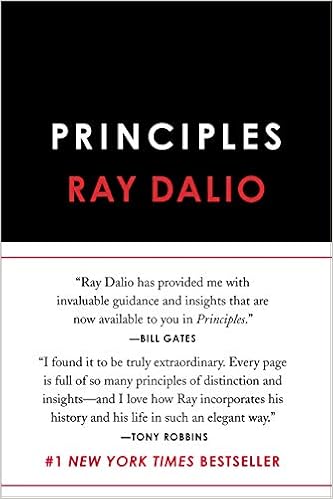If you know that you are blind, you can figure out a way to see, whereas if you don’t know that you are blind, you will continue to bump into your obstacles.
If anyone can refute me‚ show me I’m making a mistake or looking at things from the wrong perspective‚ I’ll gladly change. It’s the truth I’m after
Marcus Aurelius
Raymond ‘Ray’ Dalio is an American billionaire investor, hedge fund manager, and philanthropist. Dalio is the founder, co-chairman and co-chief investment officer of investment firm Bridgewater Associates, one of the world’s largest and most successful hedge funds, which he founded out of his two-bedroom apartment in New York in 1975. Under his leadership, the firm has grown into the fifth most important private company in the U.S. according to Fortune Magazine.
By studying the history of the markets and using computers to test predictions against historical markets, Dalio and his Bridgewater colleagues were one of the only funds to predict the 2007/2008 Global Economic Crisis. Bloomberg ranked him as the world’s 58th-wealthiest person in June 2019.
Read more…
Trust in Radical Truth and Transparency
In 2017, Dalio published ‘Principles‘, in which he outlines principles on how to be successful that he had developed while running Bridgewater Associates. After receiving a frank memo from his top lieutenants in 1993 concerning his interpersonal performance as a manager at Bridgewater Associates, Ray began to develop a unique company culture based on these principles and unadorned feedback. Part of this unadorned feedback involves being what he calls ‘radically open-minded’. The goal of the following blog is to outline the benefits of and how you too can practice open-mindedness.
Benefits of Open-Mindedness:
If you know that you are blind, you can figure out a way to see, whereas if you don’t know that you are blind, you will continue to bump into your obstacles.
If you can recognise that you have blind spots and open-mindedly know that other persons may see something better than you and that the threats and opportunities they are pointing out truly exist you are more likely to make good decisions.
How To Practice Radically Open-Mindedness:
To be radically open minded you must:
1) Sincerely believe that you might not know the best possible path, and recognise that your ability to deal well with ignorance is more important than whatever it is that you know:
Most people make bad decisions and actions because they refuse to consider other options. Coming up with good questions is more important than having all the answers. You can not make a good decision without initially being in a state of not knowing because what you don’t know is vast and more exciting than anything you currently know.
2) Recognise that decision making is a two-step process:
First, take in ALL the relevant information then decide.
Most persons have a conformation bias and only consider information that confirms their previous beliefs.
3) Don’t worry about looking good; worry about making the right decisions and achieving your goal:
People usually try to prove that they have the answer, even when they do not.
Why?
They believe the common view that great people have all the answers and do not have any weaknesses. They have a Closed Mindset.
A Closed Mindset is both not true and stands in the way of you learning and developing skills.
Get comfortable with being uncomfortable and not being certain of yourself. Recognise that you have weaknesses and blind spots. Seek to challenge yourself and overcome your obstacles.
4) Realise that you can not put out without taking in:
Most people seem more keen to convey informations, that is put out their thoughts, than to learn and take in information. This is a mistake, even if your primary goal is to teach because what one puts out will not be any good unless one also takes in information.
5) To gain the perspective of someone else you must not judge:
Only by having utter empathy can you gain another point of view. Open-mindedness doesn’t mean going along with what you know not to be true. It means considering the point of view of others instead of irrationally holding your own point of view.
To be radically open-minded, you need to be so open-minded to the view that you might be wrong that you encourage others to tell you so.
6) You want the best answer, not the best solution that you thought up:
You do not need to find the answer in your own thoughts, you can look outside yourself. To be objective, the probability of you always having the right best answer is slim. Even if you do have the best solution, you can not be sure until others test you and pull apart your solution.
You always don’t know what you don’t know. You need to ask yourself, “Am I seeing this just through my own eyes?”. If so, then you must realise that you are disabled.
7) Be clear about whether you are arguing or seeking to understand:
Think about what is more appropriate based on your and other’s believabilities. If both persons are on par, then it may be appropriate to debate the matter. If one person is clearly more knowledgeable, it is preferable for the less knowledgeable one to approach the discussion as a student and for the knowledgeable one to act as the teacher.
Doing this well requires you to understand the concept of believability. Ray Dalio defines ‘believable people’ as those that have repeatedly (at least three times) successfully accomplished the task in question and who have great explanations of their modus operandi when questioned.
If you have a different view than someone who is more believable on the topic than you are – for example, when you are discussing your health with a medical professional – you should make it clear that you are asking questions in a hope to understand their perspective, not questioning their authority. Conversely, if you are the more believable person, you might politely remind the others of that and suggest that they ask you questions.
All these strategies come together in two practices that, if you seek to become radical open minded, you must master.
1) Appreciate the art of thoughtful disagreement:
The goal of a debate is not to convince the other person that you are right. Your goal is to find out if you are the wrong person or which viewer is true. You will find more about the other’s point of view when you ask questions. Once you have their answers, see how that fits in with your thoughts and modify if necessary.
2) Triangulate your view with believable persons who are willing to thoughtfully disagree:
By having two persons debate a topic and listening in, asking questions and giving your views when asked, you will learn and raise your probability of being right in future. This is most true when at least two persons in this three-way discussion disagree with each other. Smart people who can thoughtfully disagree are the best teachers.
If you do not have enough time to gain a well-informed perspective or the task is too complicated for your level of understanding, don’t just plough on with your plan ill-informed, assign the task of making the decision to a believable person or have two or more qualified persons debate it and let them decide.
So, there you have it. Why and how you should practice open-mindedness.
Enjoy
Scott
PS. If you think one or more of your friends may benefit from reading post, please Share it on the Socials using the buttons around the page


